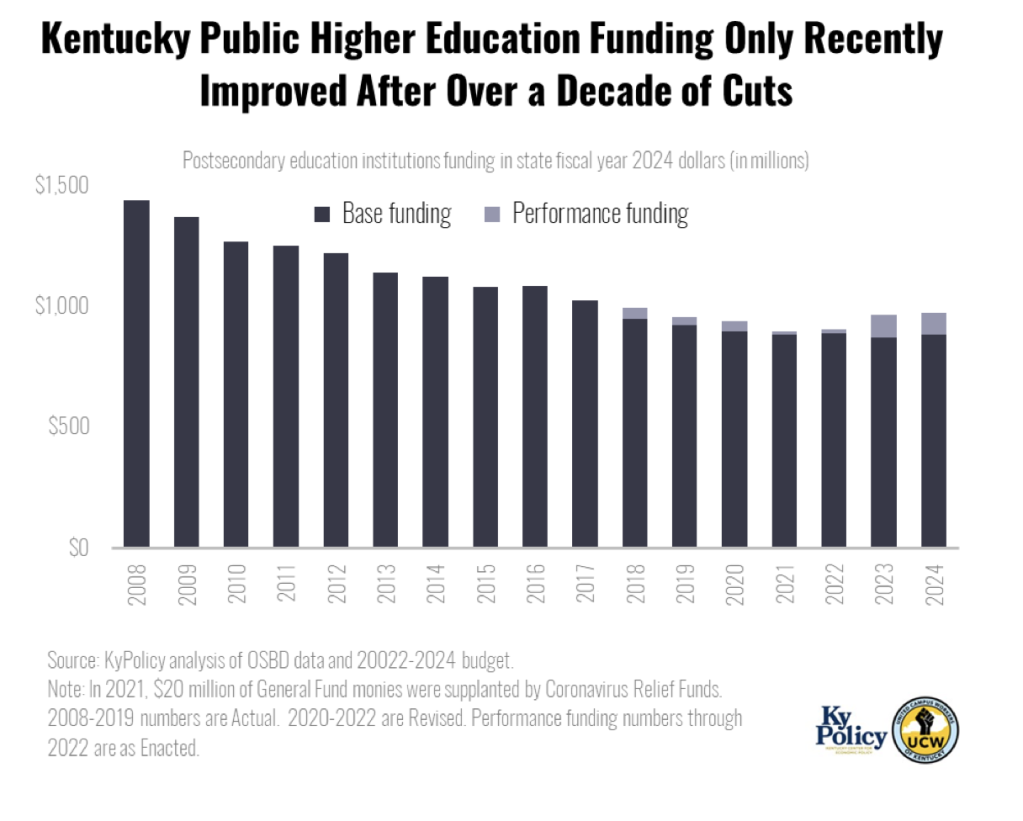Group ‘sounds alarm’ on higher education underfunding
Published 8:00 am Tuesday, December 26, 2023

- State funding for higher education faced a significant decline from 2008 to 2021 when adjusting for inflation, according to a KyPolicy analysis.
Kentucky higher education is buckling after over a decade of declining state funding, according to a recent report released by the Kentucky Center for Economic Policy and the United Campus Workers of Kentucky.
During 2008’s Great Recession, the General Assembly made significant cuts to higher education funding. Despite “modest” increases in the past two years, there is still much ground to make up, the report’s authors said.
Adjusting for inflation, higher education funding in the current fiscal year is 32.4% lower than in 2008 – about a $357 million difference.
KyPolicy and UCW allege that Kentucky’s public postsecondary institutions have increased tuition and fees to keep up, leading to students carrying more of the financial load.
Since 2008, students have paid more toward their education than the state. Now, the state pays about a third of the cost, while students pick up the rest.
The authors allege that this has exacerbated the unaffordability of higher education, with individuals and families having to take on debt to attend college.
Dustin Pugel, policy director of KyPolicy, said that this hurts more than just the students trying to earn degrees.
“They’re good for everyone in the commonwealth,” he said. “These are economic engines that improve the well being of everyone. So these are real problems.”
What does the report say?
KyPolicy and UCW surveyed over 1,300 campus workers across the state’s eight public universities and community college system.
Over half of surveyed workers said that pay was their top concern. The workload and a lack of input in institutional decision-making were the next most prevalent concerns.
About two-thirds reported that their department is understaffed and that it has cut tenure-track positions. Approximately 70% said that they had considered leaving their job in the past year for reasons other than retirement.
“Respondents said that lack of funding and low pay make it harder to recruit and retain staff and that these are the primary drivers of staffing shortages,” the report stated.
Faculty reported that they’ve had to spend more time on administrative paperwork, direct recruitment and student support services, like addressing mental health challenges, due to staff shortages.
Elise Franklin, a University of Louisville assistant history professor, said that since 2019, she’s experienced bloated class sizes that hurt student learning outcomes, a greater non-teaching workload and crumbling infrastructure that puts student safety and success in jeopardy.
“It affects the students every day,” Franklin said. “We all show up and invest in U of L, and I think that it’s time for the state to help the university invest in us.”
Faculty and staff also feel like they don’t have enough say in their institution’s decisions, according to the report. Respondents said they felt like their input was not taken seriously.
“These are the voices that should be heard the most when we are discussing the course and needs of our institutions,” said Shelly Baskin, a UCW staff member.
“Especially since they are the ones that are involved deeply with the day-to-day running of the institution and have the best understanding of the needs of the students and the community at large that these universities support.”
The report’s authors take issue with the state’s performance funding model, which they say has left Kentucky State University and Morehead State University behind, despite serving the highest proportions of low-income students.
In the last two years, KSU and MSU have received no performance funding dollars, while the state’s other public universities brought in about $150,000 combined.
What are they asking the state to do?
KyPolicy and UCW are asking the legislature to remedy some of these issues using the state’s current “rainy day fund” surplus.
First, they are asking for the state to restore higher education funding to pre-2008 levels.
Second, they want to revise the performance funding model to ensure equity for institutions serving students with the greatest needs.
Third, they want the state to provide funding for significant faculty and staff salary adjustments to “make up for long term erosion.”
Fourth, they are asking the legislature to protect the right to academic freedom in research and classrooms.
Fifth, they would like to increase faculty and staff’s voices in institutional decision-making by adding to the number of employees elected to higher education governing boards.
Finally, they want the legislature to express its support for formation of unions that can collectively bargain for better compensation and working conditions.
Gov. Andy Beshear released his budget last week. It addresses some of these issues.
His proposal would increase higher education base funding by nearly 8%, a total of $138 million across the next two fiscal years.
It also includes $400 million for deferred maintenance and several new student loan forgiveness programs in key worker shortage areas like nursing and social work.




